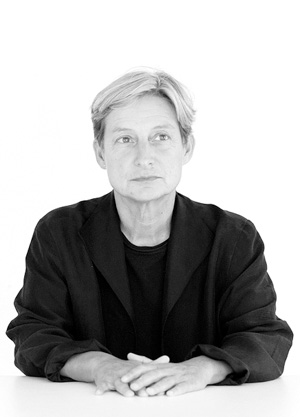Happy (Belated) Birthday to Judith Butler
February 24 was the birthday of famed philosopher Judith Butler. Butler is a prolific scholar of diverse interests. She has published important books on feminist and queer theory, modern French philosophy, literature and literary theory, political ethics, and Jewish philosophy. In honor of her birthday, we wanted to take a brief look at her career as an “oft-cited academic superstar.” Butler’s newest book, Parting Ways: Jewishness and the Critique of Zionism, will be released in July.
Judith Butler first rose to prominence with her critique of traditional notions of the essential nature of gender. In Gender Trouble: Feminism and the Subversion of Identity, Butler’s hugely influential bestseller, she claims that, rather than being purely biological and thus set at birth, gender is primarily the result of the performance of culturally dictated acts. These acts are largely responsible for the binary way that gender has been viewed historically. By recognizing the effect that cultural pressure has on our conceptions of what it means to be masculine and feminine, we can gain a more flexible understanding of personal identity, a conception that serves as one of the bases of Queer Theory as an academic discipline.
While Gender Trouble was incredibly popular and influential, rather than be limited by its popularity, Butler moved into other areas of interest, expanding on her ideas about gender performativity. She has written on censorship and power, on the way our limited knowledge affects our ethical responsibilities, and on Kierkegaard and Kafka. She has been able to bring her unique understanding of a wide array of philosophical ideas (particularly those of Hegel) to bear on literary figures, making her an important member of the literary theory scholarly community. In Antigone’s Claim: Kinship Between Life and Death, Butler brings a fresh perspective to the oft-discussed Antigone, claiming that Antigone’s complex family relationships place her in opposition to the binary heterosexual norms of the state.
More recently, though, Butler has moved into the political arena. Never one to shy away from taking a vocal, public role in supporting or opposing political ideas, Butler has been particularly outspoken on the political future of Israel. In her dialogue with Israeli filmmaker Udi Aloni in his recently published examination of the Israeli-Palestinian conflict, What Does a Jew Want?: Binationalism and Other Specters, Butler claims that this political outspokenness arises from what she was taught growing up: “as a Jew, I was taught that it was ethically imperative to speak up and to speak out against arbitrary state violence.” In her powerful essay in the collection, The Power of Religion in the Public Sphere, Butler argues that neither Jewishness nor Judaism should be conflated with Zionism, and that a state truly based on Jewish principles would emphasize universal and inalienable rights for all its citizens.
Butler continues and deepens this line of thought in her upcoming book with Columbia University Press, Parting Ways: Jewishness and the Critique of Zionism. By comparing the dispossession of the Palestinians with the long history of Jewish dispossession and suffering, Butler concludes that Jewish ethics not only allow but require a critique of Zionism and support the idea of a one-state solution.
Throughout her long and successful career, Judith Butler has challenged the foundational beliefs that ground our most common cultural norms. She has changed our notions of what it means to be a state, what it means to be good, and what it means to have an identity. Perhaps the most important aspect of her career, though, is her willingness to apply her impressive theoretical knowledge to real world situations, to diagnose societal problems and instigate practical change for the better.





